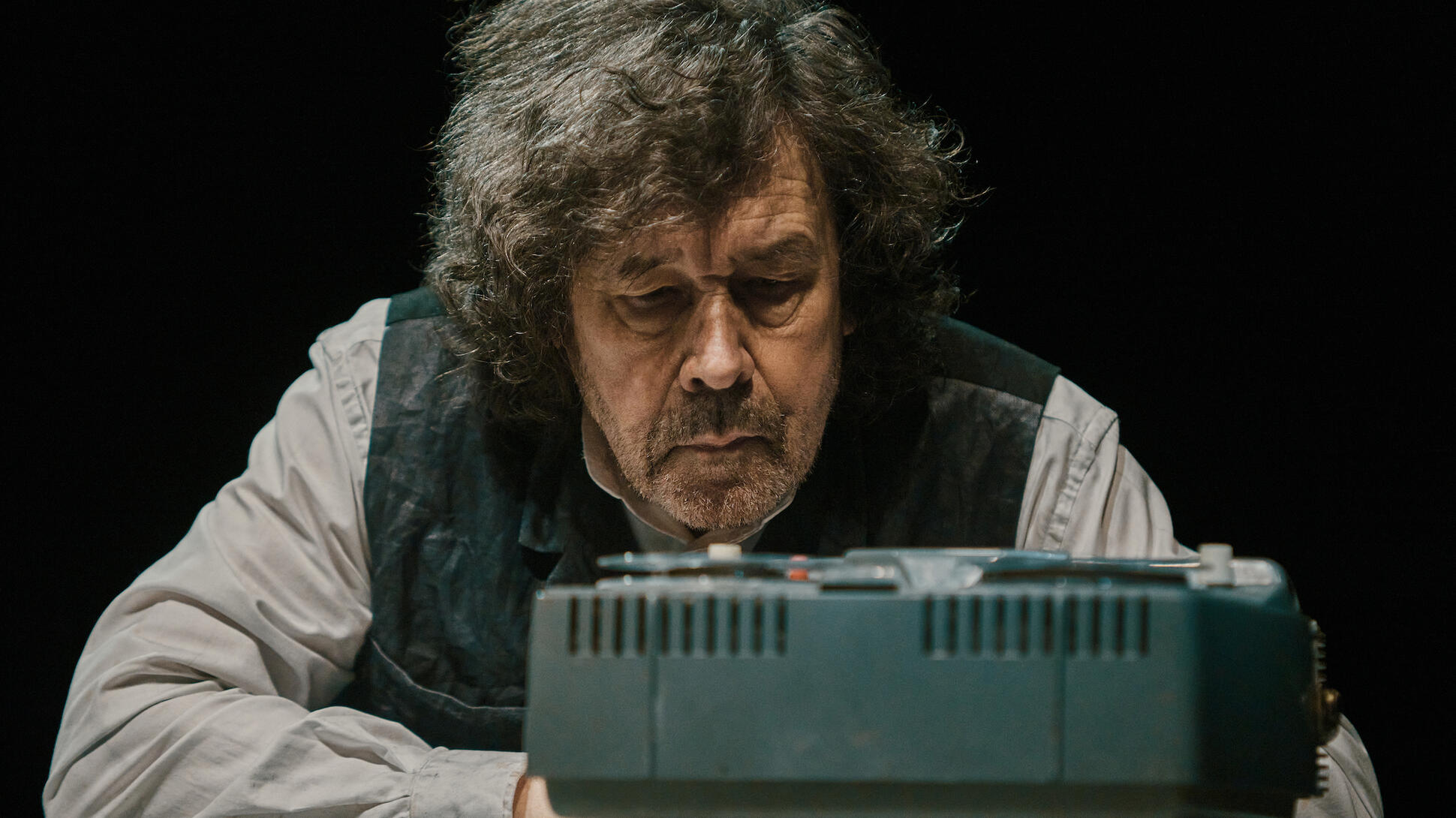Some plays whisper more than they speak. Krapp’s Last Tape is one of them. Haunting in its restraint, Beckett’s one-man meditation on memory, isolation and loss finds quiet brilliance in this new production directed by Vicky Featherstone. And at its centre sits Stephen Rea, not so much acting as embodying a man collapsing inward – slowly, softly – through time.
The play is a translucent monologue with oneself, and with others one has once been. The most striking theme is that of past, long gone emotion; that of past love. I put my head on her breasts… And we laid there in silence. The steep rejection of sentimentality that characterises Krapp’s current internal monologue is no more than an instrumentalisation of cynicism as a survival tool. For, how can one reconcile past echoes of tenderness with the granite apathy of the lonely?
It is such that tenderness, in its ulterior form, is that delicately balanced Damocles’ sword; hanging over our heads it’s the inevitable, murderous danger of its loss. But how could one resist the banquet? How can one do away with the luscious platters, the carefully assembled pink, lilac, violet desserts? The answer is clear. I do not know many beings whose instincts do not make them seek such flavours. All animals, every cat and every dog, every tiny fish that inhabits the cobalt blue profundities of the sea invariably seek that touch. It is the message of every sunflower whilst it turns towards the kindness of sun. That warm, soft feeling of a ray of light that dances on the skin in the midst of a December day, a breath of fresh air when one is drowning; this is tenderness.
But tenderness is not only reserved to warm, breathing beings. It is found in every activity and motion in the world. In every dialectical response, in every soft movement. A thin plastic bag that waltzes with the erratic conduction of the wind; this is tenderness. The observation of nature and its delicacies; leaves of grass. Krapp himself remarks, in one of his tapes, this nuanced past perception of a leaf, or a flower.
In English there is no word that can encompass this meaning: sentimentality or sensitivity hold a certain pejorative, condescending touch. A steep rejection of emotion disguised in an almost laughing manner. This is how language limits our scope of being, our allowances and perception of the self – if we are sensitive, we must be mocked, or pitied. How very sad an existence for the English speaker! In other languages, such as Spanish, sensibilidad implies a certain elegance and intelligence of perception, that has to do with the most intimate feelings of the heart. One is sensible if one can feel deeply and with the discerning of an active, bright mind and an open heart.
Our languages do keep us bound. However, Krapp’s conundrum happens not in the realm of language necessarily, but of tangible loss and passage of time. The only way to live after one has been touched with softness, after having laid one’s head on another’s breast, might be to turn to irony and scorn. Did I really speak like that? What a fool! Krapp seems to think. And how very relatable! Haven’t we all made ridiculous a memory of past love, haven’t we all resentfully laughed from the chair of our isolation?
It is starving to live without tenderness once one has had it. Krapp’s attempt to fill such a void with bananas is, I am afraid to say, unsuccessful. Time passes, and all the things that seem bright gradually lose their light. Youth, beauty, intellect. Love, maybe for some. One can dream of past lovers, or one can close the door and eat the key. Krapp seems to act as if he chose the second option, but this is in itself a lie. The very ritual of listening to past tapes is a key; this time, however, it unlocks the brutal reality of his becoming. His becoming a man who does not anymore understand the delicate threaded patterns of love. A man who could not understand Penelope’s twenty-year long weaving, her waiting. A man who might have once held the noble endeavours of Ulysses, but got irrevocably lost on the way back to Ithaca.
Rea’s Krapp is brittle and ironic, but never flat. His silence is eloquent, his stillness intentional. The contrast between the brittle shell of the older man and the disembodied optimism of his younger voice (recorded decades ago by Rea himself) creates a rupture that is both theatrical and deeply human. Featherstone allows the space to breathe, with every pause stretched into meaning, every rewind of tape laced with dread.
Jamie Vartan’s set is as sparse as memory itself. A desk, a stool, spools of old recordings. There is no clutter, only the essentials. – and that is enough. Paul Keogan’s lighting gives the space a ghostly dimension, moving between cold introspection and faint warmth. Kevin Gleeson’s sound design allows the past to speak with eerie intimacy, the tapes crackling with desire and decay.
There is no resolution in Krapp’s Last Tape, only the soft unravelling of one man’s self, recorded, rewound, replayed. It is Beckett at his most piercing, and Stephen Rea brings it to us with a gravity that is impossible to ignore.
Krapp’s Last Tape by Samuel Beckett
Directed by: Vicky Featherstone
Performed by: Stephen Rea
Running time: 55 minutes, no interval. (No late comers or readmittance)

